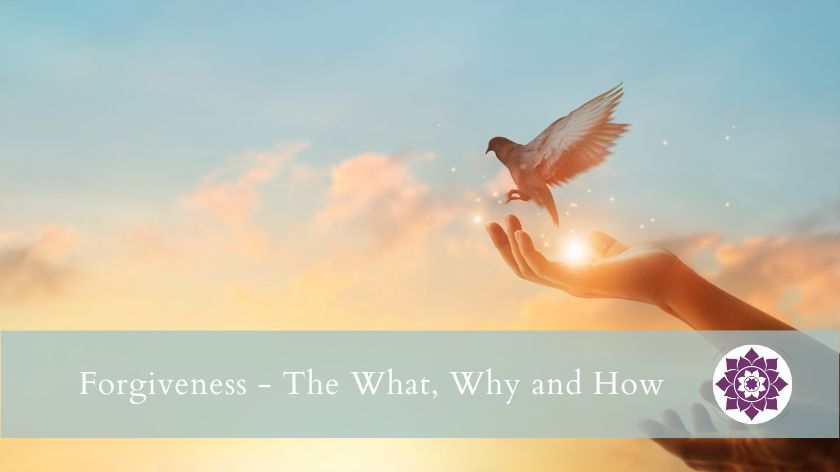Forgiveness is all about letting go of resentment, anger, or any negative emotions that you may feel towards someone who has harmed you or caused you pain. It is a way of releasing these negative emotions and moving on from the hurt or harm that has been inflicted upon you. Research shows, it is usually the close ones in our life that hurt us the most. And therefore, it becomes all the more important for us to forgive them. If not, how do you continue living under the same roof or be in the same workspace as them?
Sidra Jafri says ‘Forgiveness means letting go of all those emotions that are stored in your body, which you no longer want to feel in life.’
There are several aspects of forgiveness that are important to understand:
Forgiveness is a personal decision: It is a choice that you make to let go of negative feelings towards someone who has caused you harm. It is not something that can be imposed upon you by others or forced upon you.
Forgiveness does not mean forgetting: It is important to remember that forgiveness does not mean forgetting about the harm or pain that has been inflicted upon you. It simply means that you are choosing to let go of the negative feelings that you have towards the person who caused you harm.
Forgiveness can be difficult: Forgiveness is not always easy and it may take time to fully process and let go of negative emotions. It may also involve dealing with difficult emotions such as anger, resentment, and hurt.
Forgiveness can benefit you: While forgiveness is often thought of as something that is done for the benefit of the person who has caused harm, it can also have many benefits for the person who is doing the forgiving. These benefits may include improved mental and physical health, increased feelings of happiness and well-being, and the ability to move on from negative experiences.
Although the benefits that come from forgiving someone are aplenty, we still struggle to let go. Holding onto resentment, anger, or other negative emotions towards someone who has caused you harm can have a number of negative consequences.
Here are a few few challenges you may face
Health – Not forgiving someone means you allow the emotions of anger and resent to continue to live in your body, creating disease and discomfort. It can lead to ongoing feelings of hurt and anger, which can interfere with your ability to move on from the experience and enjoy a healthy and fulfilling life. It can also lead to increased feelings of stress and anxiety, which can have negative effects on your mental and physical health.
Thoughts – In addition, not forgiving someone can lead to a negative cycle of thoughts and behaviours. You may find yourself constantly thinking about the hurt or harm that was inflicted upon you, which can lead to further feelings of anger and resentment. This can create a cycle of negative emotions that is difficult to break.
Relationships – Not forgiving someone can also damage relationships and create barriers to building new ones. It can be difficult to have a positive relationship with someone if you are unable to let go of negative feelings towards them. You see the person in the new relationship with the coloured lens of the previous experiences. This is not being fair to yourself or the other person.
Lack of judgement – When you are unable to let go, it causes you to cloud your judgement to make decisions, because you are still holding onto the bitterness of the past. It blurs your vision, you see the world from the space of hurt and resent, making you feel unsafe and insecure.
Essentially there are 5 important aspects to forgiveness
- Acknowledge the hurt and know that you need to forgive. This is the first and most crucial step towards forgiving someone. When you acknowledge that you are hurting, is when you can move to the next step, that is understanding the need
- Release the need for them to learn, understand or realise. It is important to know that you are better off shedding your ego over this and not being stuck in righteousness. However unforgivable the act, and no matter how right you are – holding on is not going to serve you.
- Identify the lesson and integrate it. When similar instances of hurt and resentment come up, make sure you look out for patterns. When this happens it usually means there is some lesson in that situation that you need to integrate. Once you do it, moving forward will become easier.
- For you – Forgiveness is always about you and not about them. You are doing this for yourself, to set yourself free and clear your mind from these thoughts.
- Letting go Once you see through the above 4 aspects, letting go will come more easily to you. So set yourself free to move ahead and enjoy new experiences in life.
In summary, forgiveness is a way of releasing negative emotions and moving on from hurt or harm that has been inflicted upon you. It is a personal decision that can be difficult but can also have many benefits for the person doing the forgiving. The moment you understand how important it is to let go, and move in that direction, know that you are taking your power back and setting yourself free on all levels.
To help you integrate forgiveness, you can listen to this guided process to move forward.
Forgiveness – A guided meditation
Listen to the forgiveness process and do clearances till you reach a space of zero charge for that person.
Write a divine clearing statement 7 times x 7 days
I’m sorry, please forgive me, thank you, I love you. From this moment I exchange only the energy of love and respect with you.




